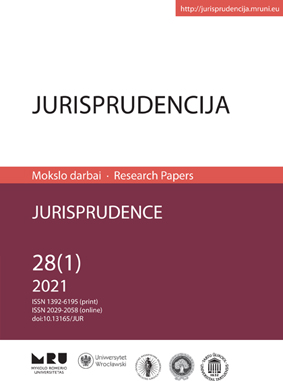2020 M. RUSIJOS KONSTITUCIJOS PATAISOS IR
KONSTITUCINĖS JURISPRUDENCIJOS LABIRINTAI
THE 2020 AMENDMENTS TO THE RUSSIAN CONSTITUTION AND THE LABYRINTHS OF CONSTITUTIONAL JURISPRUDENCE
Author(s): Toma BirmontienėSubject(s): Constitutional Law
Published by: Mykolas Romeris University
Keywords: Constitution; constitutional amendments; the 2020 amendments to the Russian Constitution; Constitutional Court; constitutional jurisprudence;
Summary/Abstract: This article examines the 2020 amendments to the Constitution of the Russian Federation (1993), the process of their adoption, and their impact on the development of constitutionalism in Russia. The constitutional amendments in question were initiated by the President of Russia at the beginning of 2020, were adopted with urgency by the Russian Parliament, were subsequently approved by the “all-Russian vote”, and finally entered into force on 4 July 2020. They not only changed the content of the Russian Constitution, but also altered constitutional values, and have led to a crisis in the identity of the Russian Constitution. These constitutional amendments serve the interests of the authoritarian state and demonstrate the fate of the constitution, where the role of supreme law has been lost. While considering the erroneous path of adopting the 2020 constitutional amendments, this article is devoted to an analysis of the opinion set out in the respective conclusion of the Constitutional Court of the Russian Federation, which assessed the process under discussion and the content of the proposed constitutional amendments by interpreting the provisions of the Russian Constitution. This opinion created preconditions for the entry into force of the amendments to the Constitution. Thus, the main attention in the article is focused, in particular, on the assessment given by the Constitutional Court of the Russian Federation rather than the content of the constitutional amendments. The 2020 amendments to the Russian Constitution can be designated to certain groups, concerning: the institution of the President and the strengthening of his powers; the powers of other state authorities; the composition and powers of the Constitutional Court; provisions on the development of social guarantees; family life; ideological provisions; and the relationship between constitutional law and international law. Thus, the scope and the content of the changes suggests that these amendments constitute not a mere alteration of individual constitutional provisions, but the emergence of new autonomous constitutional content in conflict not only with the text, but also with the spirit of the former Russian Constitution. The Constitutional Court did not make any appraisal of the fact that the proposed amendments to the Constitution fundamentally disrupt the framework of the Constitution itself. The 2020 amendments to the Russian Constitution give rise to many important constitutional questions: where the limits to formal constitutional amendments lie, and whether the constitution can protect itself against foreign matter that apparently destroys its original constitutional ideas and denies the spirit of the constitution. Neither the conclusion given by the Russian Constitutional Court, nor the “all-Russian vote” carried out on 1 July 2020 assuage these doubts. Hence, this article investigates problems related, inter alia, to the nature of constitutional amendments and their destructive role, the role of the Constitutional Court of the Russian Federation in the process of amending the Constitution, and the political character of such an institution in an authoritarian state.
Journal: Jurisprudencija
- Issue Year: 28/2021
- Issue No: 1
- Page Range: 9-32
- Page Count: 24
- Language: Lithuanian

